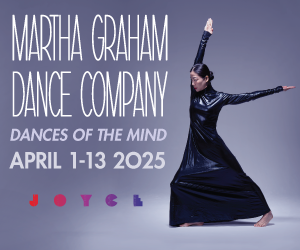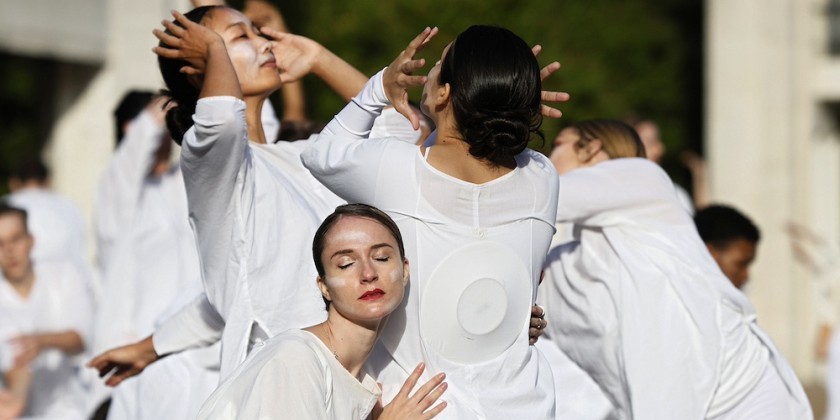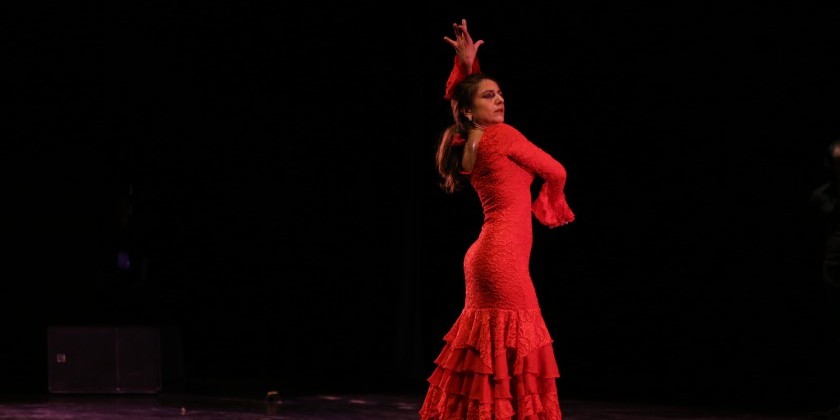Shall We Dance \, or Shall We Engage in some Body-Based Movement?
Words are important, so grab your thesaurus
...Maybe this radical shift of language (New York Live Arts) will bring a shocking energy and revitalization to our field. I hope so, because I feel a loss of identity and I am sad.
I am a dancer.
I am a dancer.
Yesterday, in the Wall Street Journal (article here) culture writer, Pia Catton, wondered how much enthusiasm there can possibly be for dance and if it can be sustained. In the article, NYC leaders of the field referred to a vocabulary for future survival. Lane Harwell, Director of Dance/NYC, spoke about dancers as a "community trying to find a new language" for what we do, as well as searching for new ways to interact with audiences. Bill T. Jones, whose company's merger with Dance Theater Workshop will give birth to the new entity NEW YORK LIVE ARTS, is described as wanting to stay away from the word “dance," preferring “body-based movement” or “ body-based performance”. Janet Eilber, Artistic Director of The Martha Graham Dance Company discussed the challenges of changing terminology. What do you do when a “revolutionary”, “rebellious” art form becomes “classic”? Jonathon Hollander, Artistic Director of Battery Dance Company, used the word “nutrition” instead of funding, and the word “entrepreneurial” to describe what dance companies need to be. (Dancers have always been “entrepreneurial” but that used to be a “business word” now it is an essential element to a dancers lexicon.)
So, grab your thesaurus everyone. We need new words, new ways of thinking and new methods of engaging with the public because our federal funding is once again under severe threat to be cut * and it is up to us (as usual) to figure out how to exist, and what our existence will look like. What words and ideas appeal?
So, grab your thesaurus everyone. We need new words, new ways of thinking and new methods of engaging with the public because our federal funding is once again under severe threat to be cut * and it is up to us (as usual) to figure out how to exist, and what our existence will look like. What words and ideas appeal?
Perhaps a new language for dance is not about new vocabulary for what we do, but about using our words.
Words-written, spoken, texted, Twittered, Facebooked--words say,
"I am part of the community. I am a dancer. I live here. I bring color, and vibrancy and money to our community. I eat in your restaurant. I shop at your store. Without my work, our community becomes less rich."
Words-written, spoken, texted, Twittered, Facebooked--words say,
"I am part of the community. I am a dancer. I live here. I bring color, and vibrancy and money to our community. I eat in your restaurant. I shop at your store. Without my work, our community becomes less rich."
Does the word "dance" need to be replaced with " body based performance" so that more people will attend contemporary shows? Do more people appreciate and relate to theater type experiences than dance? Does a clearly explained combination of art forms sell more tickets and render our art form more profitable and appreciated? What is in a name? To my ears other names for dance sound coldly intellectual and far removed from the vital human body. But maybe this radical shift of language (New York Live Arts) will bring a shocking energy and revitalization to our field. I hope so, because I feel a loss of identity and I am sad. I am a dancer.
Last weekend, Dance/ NYC sponsored its Mid Season Symposium in which arts professionals converge to discuss such issues. How do we engage people in our work in new ways, how do we get our communities to support dance, and finally, how do we survive in a more precarious financial situation? Different words, but pretty much the same question that was asked in a 2009 Dance/ USA Winter Symposium, “What happens when budget cuts bring you to the threshold between do- able and not do-able?"
What I appreciated about this symposium was the attendance of representatives from our United States Government who stood with us and voiced their support and appreciation for dance (even as many of their peers attempt to cut our funds.)
Dancers are not alone.
Certain government leaders understand how vital dance is to our community and are eager to find new vocabulary and ideas too.
They want to be more “creative”,
less "bureaucratic"
and more
“accessible”.
Certain government leaders understand how vital dance is to our community and are eager to find new vocabulary and ideas too.
They want to be more “creative”,
less "bureaucratic"
and more
“accessible”.
What I appreciated about this symposium was the attendance of representatives from our United States Government who stood with us and voiced their support and appreciation for dance (even as many of their peers attempt to cut our funds.)
Ann Berry Howe, Senior Counsel and Senior Advisor to New York State Senator Kirsten Gillibrand, spoke to artists about how to advocate for ourselves and each other. Howe, who laughed, that she was a dancer "back in the days that dinosaurs walked the earth," urged usually quiet dancers to get out of the studio and act, speak up about what we do and how we contribute to our community. Even if done in small ways, getting out and talking is an important form of advocating. Howe remarked that Senator Gillibrand didn't recommend cuts for the arts but endorsed a budget increase, citing how arts bring commerce into our community. Her counterparts from other states need to be convinced, however. Howe implored us to speak, or write to representatives about supporting the arts. Many representatives have Facebook pages, friend them, talk to them. One of the dancer attendees suggested we put our representatives on speed dial and quickly call them about important issues during breaks in our day.
Maura M. Pally, Deputy Assistant Secretary, to U.S. Department of State Bureau of Educational and Cultural Affairs talked about how the State Department could facilitate dancers performing abroad. If your company is going abroad, The Department of State wants to help you. Maybe they cannot give you funds directly, but if you give them enough lead time they will give you names of interested people in the community that you will be visiting, and places where you can hold workshops. They can even connect you to a diplomat who might want to throw you a party.
Amy Fitterer, the new Executive Director of Dance/ USA, dances representative in Washington DC, also shed light on how dancers can advocate for each other, and how Dance/ USA was working on new programs to help our government learn about the power of dance. One new program in particular that she highlighted was making sure that cultural attachés, while in diplomatic training, would be fully advised about the possibilities of dance as cultural diplomacy and the resources that Dance/USA can provide.
These speakers were not painting a peachy picture of the future in terms of financial support, but they were saying, that if we can cooperate and work with them, they are there to help us. Dancers are not alone. Certain government leaders understand how vital dance is to our community and are eager to find new vocabulary and ideas too. They want to be more “creative”, less “ bureaucratic” and more “accessible”.
Perhaps a new language for dance is not about new vocabulary for what we do, but about using our words. Words-written, spoken, texted, Twittered, Facebooked--words say,” I am part of our community. I am a dancer. I live here. I bring color, and vibrancy and money to our community. I eat in your restaurant. I shop at your store. Without my work, our community becomes less rich. Here, I want to invite you to take my class and see my friend perform."
Perhaps our new language and new engagement revolve around a very traditional concept of communication— “conversation with our neighbors”.
--Christine Jowers
--Christine Jowers
*FOOTNOTES- Yesterday, an amendment to reduce 2011 Fiscal year funding to the National Endowment for the Arts by 0.6 million was approved by the House of Representatives. This amendment was on top of the 2.5 million funding reduction already recommended by the House Appropriations Committee. The House 2011 continuing budget resolution now includes a 3.1 million funding decrease to the NEA, which represents a 25% cut from current funding.















